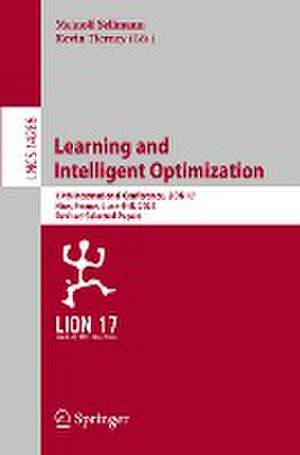Learning and Intelligent Optimization: 17th International Conference, LION 17, Nice, France, June 4–8, 2023, Revised Selected Papers: Lecture Notes in Computer Science, cartea 14286
Editat de Meinolf Sellmann, Kevin Tierneyen Limba Engleză Paperback – 25 oct 2023
The 40 full papers presented have been carefully reviewed and selected from 83 submissions. They focus on all aspects of unleashing the potential of integrating machine learning and optimization approaches, including automatic heuristic selection, intelligent restart strategies, predict-then-optimize, Bayesian optimization, and learning to optimize.
Din seria Lecture Notes in Computer Science
- 20%
 Preț: 1061.55 lei
Preț: 1061.55 lei - 20%
 Preț: 307.71 lei
Preț: 307.71 lei - 20%
 Preț: 438.69 lei
Preț: 438.69 lei - 20%
 Preț: 645.28 lei
Preț: 645.28 lei -
 Preț: 410.88 lei
Preț: 410.88 lei - 15%
 Preț: 580.46 lei
Preț: 580.46 lei - 17%
 Preț: 427.22 lei
Preț: 427.22 lei - 20%
 Preț: 596.46 lei
Preț: 596.46 lei -
 Preț: 449.57 lei
Preț: 449.57 lei - 20%
 Preț: 353.50 lei
Preț: 353.50 lei - 20%
 Preț: 1414.79 lei
Preț: 1414.79 lei - 20%
 Preț: 309.90 lei
Preț: 309.90 lei - 20%
 Preț: 583.40 lei
Preț: 583.40 lei - 20%
 Preț: 1075.26 lei
Preț: 1075.26 lei - 20%
 Preț: 310.26 lei
Preț: 310.26 lei - 20%
 Preț: 655.02 lei
Preț: 655.02 lei - 20%
 Preț: 580.93 lei
Preț: 580.93 lei - 20%
 Preț: 340.32 lei
Preț: 340.32 lei - 18%
 Preț: 938.83 lei
Preț: 938.83 lei - 20%
 Preț: 591.51 lei
Preț: 591.51 lei - 15%
 Preț: 438.59 lei
Preț: 438.59 lei - 20%
 Preț: 337.00 lei
Preț: 337.00 lei -
 Preț: 389.48 lei
Preț: 389.48 lei - 20%
 Preț: 607.39 lei
Preț: 607.39 lei - 20%
 Preț: 1024.44 lei
Preț: 1024.44 lei - 20%
 Preț: 579.30 lei
Preț: 579.30 lei - 20%
 Preț: 763.23 lei
Preț: 763.23 lei - 20%
 Preț: 453.32 lei
Preț: 453.32 lei - 20%
 Preț: 575.48 lei
Preț: 575.48 lei - 20%
 Preț: 585.88 lei
Preț: 585.88 lei - 20%
 Preț: 825.93 lei
Preț: 825.93 lei - 20%
 Preț: 763.23 lei
Preț: 763.23 lei - 17%
 Preț: 360.19 lei
Preț: 360.19 lei - 20%
 Preț: 1183.14 lei
Preț: 1183.14 lei - 20%
 Preț: 340.32 lei
Preț: 340.32 lei - 20%
 Preț: 504.57 lei
Preț: 504.57 lei - 20%
 Preț: 369.12 lei
Preț: 369.12 lei - 20%
 Preț: 583.40 lei
Preț: 583.40 lei - 20%
 Preț: 343.62 lei
Preț: 343.62 lei - 20%
 Preț: 350.21 lei
Preț: 350.21 lei - 20%
 Preț: 764.89 lei
Preț: 764.89 lei - 20%
 Preț: 583.40 lei
Preț: 583.40 lei - 20%
 Preț: 649.49 lei
Preț: 649.49 lei - 20%
 Preț: 341.95 lei
Preț: 341.95 lei - 20%
 Preț: 238.01 lei
Preț: 238.01 lei - 20%
 Preț: 538.29 lei
Preț: 538.29 lei
Preț: 600.30 lei
Preț vechi: 706.23 lei
-15% Nou
Puncte Express: 900
Preț estimativ în valută:
114.86€ • 120.27$ • 95.27£
114.86€ • 120.27$ • 95.27£
Carte tipărită la comandă
Livrare economică 09-23 aprilie
Preluare comenzi: 021 569.72.76
Specificații
ISBN-13: 9783031445040
ISBN-10: 303144504X
Ilustrații: XIV, 616 p. 172 illus., 142 illus. in color.
Dimensiuni: 155 x 235 mm
Greutate: 0.87 kg
Ediția:1st ed. 2023
Editura: Springer International Publishing
Colecția Springer
Seria Lecture Notes in Computer Science
Locul publicării:Cham, Switzerland
ISBN-10: 303144504X
Ilustrații: XIV, 616 p. 172 illus., 142 illus. in color.
Dimensiuni: 155 x 235 mm
Greutate: 0.87 kg
Ediția:1st ed. 2023
Editura: Springer International Publishing
Colecția Springer
Seria Lecture Notes in Computer Science
Locul publicării:Cham, Switzerland
Cuprins
Anomaly Classification to Enable Self-Healing in Cyber Physical Systems using Process Mining.- Hyper-box Classification Model using Mathematical Programming.- A leak localization algorithm in water distribution networks using probabilistic leak representation and optimal transport distance.- Fast and Robust Constrained Optimization via Evolutionary and Quadratic Programming.- Bayesian Optimization for Function Compositions with Applications to Dynamic Pricing.- A Bayesian optimization algorithm for constrained simulation optimization problems with heteroscedastic noise.- Hierarchical Machine Unlearning.- Explaining the Behavior of Reinforcement Learning Agents using Explaining the Behavior of Reinforcement Learning Agents using.- Deep Randomized Networks for Fast Learning.- Generative models via Optimal Transport and Gaussian Processes.- Real-world streaming process discovery from low-level event data.- Robust Neural Network Approach to System Identification in the High-Noise Regime.-GPU for Monte Carlo Search.- Learning the Bias Weights for Generalized Nested Rollout Policy Adaptation.- Heuristics selection with ML in CP Optimizer.- Model-based feature selection for neural networks: A mixed-integer programming approach.- An Error-Based Measure for Concept Drift Detection and Characterization.- Predict, Tune and Optimize for Data-Driven Shift Scheduling with Uncertain Demands.- On Learning When to Decompose Graphical Models.- Inverse Lighting with Differentiable Physically-Based Model.- Repositioning Fleet Vehicles: a Learning Pipeline.- Bayesian Decision Trees Inspired from Evolutionary Algorithms.- Towards Tackling MaxSAT by Combining Nested Monte Carlo with Local Search.- Relational Graph Attention-based Deep Reinforcement Learning: An Application to Flexible Job Shop Scheduling with Sequence-dependent Setup Times.- Experimental Digital Twin for Job Shops with Transportation Agents.- Learning to Prune Electric Vehicle Routing Problems.- A matheuristic approach for electric bus fleet scheduling.- Class GP: Gaussian Process Modeling for Heterogeneous Functions.- Surrogate Membership for Inferred Metrics in Fairness Evaluation.- The BeMi Stardust: a Structured Ensemble of Binarized Neural Network.- Discovering explicit scale-up criteria in crisis response with decision mining.- Job Shop Scheduling via Deep Reinforcement Learning: a Sequence to Sequence approach.- Generating a Graph Colouring Heuristic with Deep Q-Learning and Graph Neural Networks.- Multi-Task Predict-then-Optimize.- Integrating Hyperparameter Search into Model-Free AutoML with Context-Free Grammars.- Improving subtour elimination constraint generation in Branch-and-Cut algorithms for the TSP with Machine Learning.- Learn, Compare, Search: One Sawmill’s Search for the Best Cutting Patterns Across And/or Trees.- Dynamic Police Patrol Scheduling with Multi-Agent Reinforcement Learning.- Analysis of Heuristics for Vector Scheduling and Vector Bin Packing.- Unleashing the potentialof restart by detecting the search stagnation.
